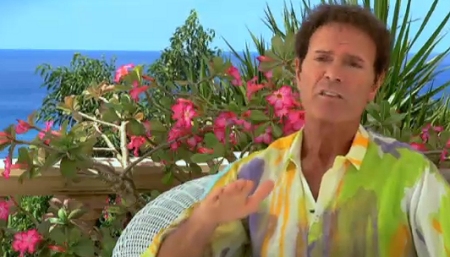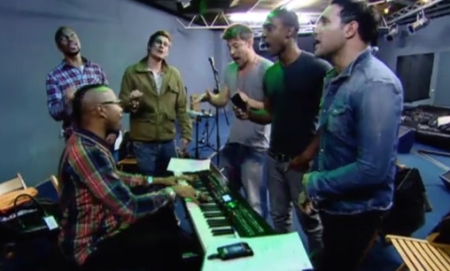Last night’s documentary from the BBC on their entry for the 2011 Eurovision Song Contest and the participation of Blue might have been flawed, but it illustrated the challenge for Blue – it’s just a shame that the larger challenge the BBC faces in the Song Contest for the future wasn’t addressed.
The production team had an hour of prime time television to fill, and they had to balance the promotion of Blue, entertaining a Saturday night audience, and educating the casual viewer about ‘modern’ Eurovision and how it’s not the same contest as it was in the seventies and eighties. From what I can see, there were three program ideas lurking in here, and they didn’t mesh together.
The first was the talking heads documentary from previous Eurovision entrants from the UK. The BBC are proud that they got Cliff Richard (1968, 1973) on camera, along with Lulu (1969) and Bucks Fizz (1981). While it’s nice to show that we were good at Eurovision forty years ago, it jarred with the core message of the second section there is a modern Eurovision, which has seen a huge change in the last deacade So yes, celebrate the heroes of the past, but what practical advice can they offer Blue?
And no offence to them, but they’re not really the sort of names that would pull in a prime-time Saturday night crowd on TV. Given that I would have preferred to speak to some of the more modern UK singers – Katrina Leskanich, Jessica Garlick and Jade Ewen would have been able to relate to the modern Eurovision far better than Cliff.

Advice from Cliff Richard, who did Eurovision 43 years ago...
The second section, the “magical rules to write a Eurovision song” just didn’t work for me for two reasons, the main one being the knowledge that Blue had already written “I Can” long before they decided to enter it at as the the United Kingdom entry for this year’s Eurovision.
I also felt cheated at the time because I don’t think that there is a formula for a winning song. The winners from the last ten years have very little in common, as anyone who listens at them would realise. But looking at the audience this program was aimed at, these casual watcher will think there is a cookie cutter formula, so much as I though this felt clichéd and trite at the time, on reflection this was a great idea, but I’m still not sold on how it was presented.
The last, and in my mind the one thread of the show that actually worked was the story of Blue getting ready for this year’s Contest. From the putting the band back together opening, though to their appearances around Europe before heading to Dusseldorf, this worked. And having slept on it, I can see why this worked, and why the style of this section shoudl have been reflected in therest of the hour.
You could easily say that five years ago, when Blue broke up, this was their departure from the music scene, and it wasn’t until they were supernaturally called (by Phil Parsons and the BBC) to represent their country at the Song Contest.
Then you moved to the first challenge, in Malta, where they realised they simply weren’t ready after a poor live performance of tech issues and forgetting the words of their song. They need to confront this feat, and carry on their quest, which they do with a small intermediate challenge (a live appearance on the Italian Top of the Pops). In other words, their initiation.
And the successful completion of that challenge is where we left it, with the might of Eurovision to come, which is not only Blue’s attempt at a return but also that of the United Kingdom.
Yes, Blue’s story is essentially Joseph Campbell’s Hero’s Journey, as discussed in The Hero with a Thousand Faces.

Blue crossing their first threshold
If it was me, I would have added a bit more from Blue into the one hour documentary, but I would have seriously reworked the other two themes in the show by using the same Hero’s Journey structure to the UK’s last decade at Eurovision.
As Eurovision transformed in the late nineties, that would also have transformed the UK’s fortunes, leading us into the abyss that represents death. There would be lots of opportunity here to show where we went wrong, trying to write what UK composers thought Eurovision wanted, and get the clips of some of the great songs from the last decade.
I would have used Cliff Richard as the spiritual helper, leading the country towards a rebirth after our atonement of not taking the Contest seriously in the last few years (Lloyd-Webber and Jade Ewen being the successful precursor to the main challenge (mirroring as Blue’s Italian appearance).
That would have been an amazing documentary, moulding Blue into an archetype of the United Kingdom at Eurovision, showing the viewing public what’s gone wrong, where Eurovision is nowadays, and handing them a flawed hero to follow and support in Germany.
Let’s be fair, airing an hour long documentary about Eurovision in the weeks before the Contest in a prime-time slot is a big thing, and the BBC should be thanked for that. But we must be constructive in our criticism, because there needs to be forward planning. No matter what Blue do this year, the UK needs a representative for next year, someone who knows that they will get the full support of the BBC, who knows they will not be slaughtered in the mainstream UK press, who knows that an appearance at Eurovision for the UK will boost their career in the same way that is does for other countries. I think the opportunity, to reinforce a message for 2012, was missed.
Your Country Needs Blue was a competent documentary, and another smart step from the BBC in the 2011 Eurovision Song Contest. “I Can” is starting to build up momentum as May approaches, and there is an expectation in the air that simply wasn’t there last year with Josh Dubovie. The United Kingdom are on course for a strong showing at this year’s Contest. How strong remains to be seen, because the field is very strong with no runaway Fairytale this year.
The hero’s journey continues for Blue, but will this be a Star Wars or a Homer’s Odyssey? We’ll find out on May 14th.









I tend to disagree with those suggesting this documentary plays a part in helping Blue at Eurovision. Not because its good or bad, but because it was for domestic UK consumption. It is the rest of Europe who will decide on Blue’s fate.
As for the influence this will play on next year’s representative, it will depend on the BBC replicating this internal selection/documentary method, or returning to a contest style selection. I certainly dont foresee another ringer in either case, unless blue are victorious. Ultimately the success of this method will be tied to the success of Blue, regardless of how strong or weak individual elements of the approach were.
I think the ultimate, albeit unmeasurable indicator will be how many europeans forgo the toilet break that on recent history, many would take with the UK entry.
Great piece Ewan. For me, I could have done without the tired old sneering in the ‘look at funny entrants from yesteryear’ style. We’ll never move forward with that, and until the Beeb gets rid of Norton we’re stuck with it, because basically, that’s his thing.
I’d also like to have seen a few previews of the entrants Blue will be up against, it didn’t really make sense without that. They won’t be competing against the past after all!
No but having a prime time Saturday night slot might have helped Blue decide to go to Eurovision and sign the contract.
I agree that there were some aspects that could have been better presented, but it *was* a BBC1 primetime show, so it was inevitable that some of the old “shocking moments” were going to be in the mix. Had the programme been on BBC4, then yes, by all means adopt a more serious tone – but then only the diehard Eurovision and Blue fans would have watched it.
I do see this programme as another step along the BBCs path towards the “de-Woganisation” of Eurovision – but it will take a long time – unless of course the UK wins. Then the BBC could set a whole new agenda for 2012 – if they could afford it!
I think the BBC should and will keep to this current internal selection method for next year as well because it’s had such a good reaction from the fans. Ratings for Eurovision will definitely be up on last year, despite the fact there will be an episode of the much-loved (although I can’t fathom why!) Britain’s Got Talent on the other side.
David, agreed that it is prime time show, but were the shocking moments actually needed? That sort of Eurovision Song Contest is long gone, yet it was still in the mix, with the “Auntie knows best” nod. But I do agree that it’s another step forward. As to affording the 2012 contest, given the locked in bduget via the EBU, participation fee and ticket sales it’s not as burdensome as you think.
I found the documentary a good watch. Ok a few issues as mentioned but it was good. I didnt think input from John Barrowman was needed as John has vener done anything with 120m viewers watching (lucky if he gets 1 viewer!)
But it showed what we have been doing wrong and ok, we had the shocking moments shown again (this is the BBC) but we havent had a documentary type programme for the selection process since Jade and even before that…we never saw that!
The documentary was ostensibly to promote the fact to the UK viewers that Blue are representing them in Dusseldorf, and can they please watch it on the BBC.
As Paul Bostock said, the programme is of no use in garnering votes for the UK, but as the ESC had relatively dire ratings last year, public awareness is all!
The BBC probably felt that it had to give a nod to their old Eurovision cliches of the past (it was a prime time Saturday night show after all) but I do think there was enough in there to show that taking the contest seriously, and putting the effort in, should pay dividends